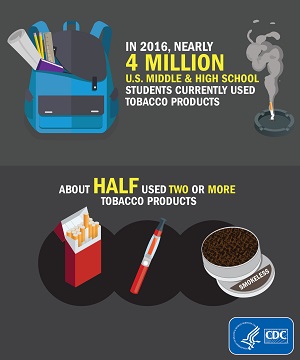Youth tobacco product use, including e-cigarettes, drops during 2015-2016
But 3.9 million youth were still using tobacco products in 2016
Press Release
Embargoed Until: Thursday, June 15, 2017, 1:00 p.m. ET
Contact: Media Relations
(404) 639-3286
The number of middle and high school students who say they are current tobacco users – defined as having used a tobacco product in the past 30 days – dropped from 4.7 million in 2015 to 3.9 million in 2016, according to new data published by the Centers for Disease Control and Prevention (CDC) and the U.S. Food and Drug Administration’s (FDA) Center for Tobacco Products. These findings from the 2016 National Youth Tobacco Survey appear in CDC’s Morbidity and Mortality Weekly Report.
The decline in use of tobacco products was primarily driven by a drop in e-cigarette use among middle and high school students from 3 million in 2015 to just under 2.2 million in 2016. In addition, declines were also seen during 2015-2016 among high school students who used two or more tobacco products, any combustible tobacco products, and hookah.
“Far too many young people are still using tobacco products, so we must continue to prioritize proven strategies to protect our youth from this preventable health risk,” said CDC Acting Director Anne Schuchat, M.D.
Tobacco prevention and control strategies at the national, state, and local levels likely contributed to the reduction in tobacco use, particularly for e-cigarettes. However, the report notes that continued surveillance of all forms of youth tobacco product use is important to help determine whether the current downward trend in youth tobacco use continues.
“While these latest numbers are encouraging, it is critical that we work to ensure this downward trend continues over the long term across all tobacco products,” said FDA Commissioner Scott Gottlieb, M.D. “The FDA has invested heavily in compelling, science-based education campaigns, such as ‘The Real Cost,’ that have already helped prevent nearly 350,000 kids from smoking cigarettes, and continues to enforce important youth access restrictions. We plan to build on these vital efforts to reduce tobacco-related disease and death.”
Nearly half of youth tobacco product users reported using multiple products
The study also found that many youth report using multiple tobacco products; 1.8 million middle and high school students reported using two or more tobacco products in the past 30 days. Among current tobacco users in 2016, 47.2 percent of high school students and 42.4 percent of middle school students used two or more tobacco products.
The report found that 20.2 percent of high school students and 7.2 percent of middle school students reported current use of any tobacco product. E-cigarettes remained the most commonly used tobacco product among youth for the third consecutive year, used by 11.3 percent of high school and 4.3 percent of middle school students. Although the data reflect a decline during 2015-2016, current use of any tobacco product did not change significantly during 2011–2016, because of the sharp increases in e-cigarettes and hookah during 2011–2014.
Key findings from THIS report on youth tobacco product use:
- Among all high school students in 2016, the most commonly used products after e-cigarettes were: cigarettes (8.0 percent), cigars (7.7 percent), smokeless tobacco (5.8 percent), hookah (4.8 percent), pipe tobacco (1.4 percent), and bidis (0.5 percent).
- Among all middle school students in 2016, the most commonly used products after e-cigarettes were: cigarettes (2.2 percent), cigars (2.2 percent), smokeless tobacco (2.2 percent), hookah (2.0 percent), pipe tobacco (0.7 percent), and bidis (0.3 percent).
- Among non-Hispanic white and Hispanic high school students, e-cigarettes were the most commonly used tobacco product. Among non-Hispanic black high school students, cigars were most commonly used.
- Cigarette use was higher among non-Hispanic whites than among non-Hispanic blacks; smokeless tobacco use was higher among non-Hispanic whites than other races.
“Tobacco use in any form, including e-cigarettes, is unsafe for youth,” said Corinne Graffunder, Dr.PH, M.P.H., director of CDC’s Office on Smoking and Health. “Tobacco products contain nicotine, which is highly addictive and can harm the developing adolescent brain.”
On Aug. 8, 2016, the FDA began enforcing new federal regulations which, among other things, made it illegal to sell e-cigarettes, cigars, hookah tobacco and pipe tobacco to anyone under 18 in person and online.
Youth tobacco product use: What can be done?
Regulating the manufacture, distribution, and marketing of tobacco products, coupled with proven population-based strategies, can reduce youth tobacco use and initiation. These strategies include funding tobacco control programs at CDC-recommended levels, increasing prices of tobacco products, protecting everyone from exposure to secondhand smoke and e-cigarette aerosol, and sustaining hard-hitting media campaigns that warn about the dangers of tobacco product use.
To learn more about quitting and preventing youth from using tobacco products, visit www.BeTobaccoFree.gov.

